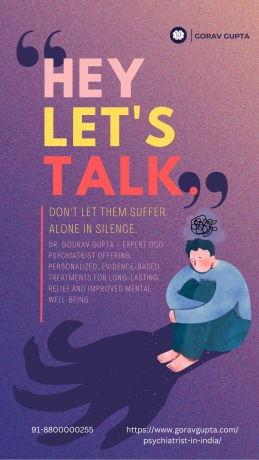There is still this stigma with seeing a psychiatrist that involves many. For instance, many individuals are resistant to visit psychiatrists due to how the public has come to perceive mental illness. However, awareness of the role of a psychiatrist for depression and the critical importance of mental health support does make all the difference in recovery and overall well-being. According to Dr. Gupta, overcoming these barriers and seeking professional help is very essential, especially focused on overcoming the stigma attached to seeking a psychiatrist for depression. "Seeing a psychiatrist is a sign of strength, not weakness," he adds. We can open up accessibility to treatment and care for those suffering from depression by breaking this stigma and busting these myths concerning the care of mental health.
Misconceptions Concerning Mental Health
According to Singh, "The greatest single barrier is stigma-particularly stigma attached to mental illness". In many ways, people feel that an experience such as depression or other mental health issues is evidence of a personal weakness or failure. This leads to even more shame and guilt from the perceived stigma of mental illness when people would find it hard to call out for professional support. According to Dr. Gupta, "Mental health challenges are as valid and deserve treatment as any physical health condition.". The stigma often makes it even harder for the sufferer to reach out, prolonging the pain.
Stigma may also, among other things, prevent frank discussions about depression, allowing myths and misconceptions to thrive. Here are some of the most common myths and misconceptions:
"Just snap out of it." This dismissive attitude ignores all the biological, psychological, and environmental factors leading up to depression.
"You're just being dramatic." This sort of minimizes the severity of someone's symptoms and their real impact on their daily life.
"Only crazy people see a psychiatrist." The stereotype manages to stigmatize those who seek professional help and fuels the idea that mental health care is something for "other people," not for "normal" individuals.
These misconceptions become the foundation of silence and shame and will keep individuals from seeking the support they need. As Dr. Gupta puts it, "The first step toward breaking the stigma is knowing that mental health challenges are common, treatable conditions."
Role of a Psychiatrist for Depression
A psychiatrist is a medical doctor qualified in diagnosing, treating, and managing disorders of the mind, emotion, and behavior. For this reason, psychiatrists differ from therapists or counselors in that they are professionals who can prescribe medication, which may be part of the treatment for many people.
A psychiatrist for depression would, therefore, be able to carry out full assessment in order to properly diagnose depression. Assessment, however, in most instances, involves a discussion with a patient regarding symptoms, past treatments, and other medical history. Only by understanding the full scope of a person's experiences can a psychiatrist create a treatment plan specifically tailored in regards to his or her needs.
Treatment Options: "From medication to therapy, even lifestyle changes, the treatment options are tremendous," says Dr. Gupta. "The most effective treatment plans often combine medication and therapy, tailored to the individual's specific situation and needs."
Medication Management: Many patients diagnosed with depression will receive medication as part of their treatment. The psychiatrist may prescribe an antidepressant or other medication to assist in mood swing stabilization, promote proper sleep, and leave a feeling of higher energy levels. "Medications may reduce symptoms to make it easier for a person to engage in therapy or other self-care practices," according to Dr. Gupta.
Beyond medications, a psychiatrist is often someone who will deliver therapy, or refer the patient to therapists or counselors. Helpful treatments include cognitive behavioral therapy, interpersonal therapy, and others that teach coping strategies, regulate stress, and optimize mental health status.
Barriers Encountered When Seeking Treatment
While critical to managing depression, various barriers have still limited many people from seeking professional help. These include:
Dread of Stigma: For them, fear of being labeled or judged as "crazy" is a serious dissuader. That is why most people avoid all form of help, even if they know they are needful.
Lack of Knowledge: It seems at times that most people don't know what a psychiatrist does or how he or she might be able to help. Lacking in education, this leads to misconceptions and keeps the neediest of individuals from reaching out for the help they would benefit from.
Access Issues: It is hard to find a psychiatrist who also accepts your insurance and has an opening when you can see them. The cost of treatment plus the many appointments it takes to get well are barriers to many accessing the care they need.
These, according to Dr. Gupta, are real barriers but surmountable. "By educating ourselves about mental health and understanding that seeking help is a proactive step, we can make it easier for people to get the support they need," he adds.
Breaking the Stigma Together
Breaking that stigma surrounding mental health and depression starts with an open conversation. It involves all this-from removing stereotypes to being kind and nonjudgmental, to nudging the ones we care about to reach out and ask for help when they need it. Here's the beginning:
Share Your Story: Share personal stories of mental illness to help others feel less lonely and more understood. According to Dr. Gupta, "Personal stories can be powerful tools for reducing stigma and encouraging people to seek help."
Educate and Advocate: Discuss the importance of mental health care and what psychiatrists do to assist with depression. Expand conversation on social media, community-based programs, and educational projects around mental health to reduce stigma.
Be an Supportive Listener: If you see someone reaching out for help, be a non-judgmental listener. Make them feel comforted and remind them of encouragement and facilitate access to the resources they need.
Normalize Mental Health Care: Normalize seeing a psychiatrist if they have issues; make one encourage friends, family members, and colleagues and normalize that seeking help is a sign of strength and not weakness, but rather a wise and mature gesture.
Seeing a psychiatrist for depression can be such an important management step to going on top of depression. Mental health care is very important to general and overall health and well-being, stresses Dr. Gorav Gupta, psychiatrist for depression. "The most important thing that everyone must remember," he says, "is that mental health conditions are treatable, and that help is always available for those who seek it.".
Overcoming stigmas and persuading people to openly discuss their depression will enable more people to seek the help they need. If you or your friend suffers from depression, do not be ashamed or embarrassed to see a psychiatrist-no one should be ashamed of that. It is an important, healthy step towards a brighter, happier future.






